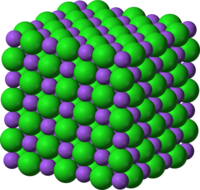
Photo from wikipedia
Myeloperoxidase is a vital component of the human immune system, producing the potent oxidant hypochlorous acid (HOCl), to kill bacteria and other invading pathogens. However, an overproduction of HOCl causes… Click to show full abstract
Myeloperoxidase is a vital component of the human immune system, producing the potent oxidant hypochlorous acid (HOCl), to kill bacteria and other invading pathogens. However, an overproduction of HOCl causes oxidative stress and damage to host cells, which promotes the development of numerous inflammatory diseases, particularly atherosclerosis. Thiocyanate (SCN-) is the favoured substrate for MPO and a potent competitive inhibitor of HOCl formation. This promotes the formation of hypothiocyanous acid (HOSCN), a selective oxidant that targets thiols, resulting in the formation of reversible oxidation products. This has led to the hypothesis that supplementation with SCN- may have therapeutic value to reduce oxidation during chronic inflammation. In this study, we compare the reactivity of HOCl and HOSCN with macrophages, and examine whether the addition of SCN- can alter the extent and nature of cellular damage. Exposure of the J774A.1 murine macrophage cell line to HOCl resulted in loss of cellular thiols, inactivation of enzymes, activation of pro-inflammatory and stress-related signaling pathways and cell death. Treatment of macrophages with HOSCN also resulted in extensive thiol oxidation and enzyme inactivation, though in this case, reversible thiol oxidation products, including sulfenic acids, were seen on a range of cellular proteins. By targeting glycolytic enzymes within cells, HOSCN could also re-route glycolytic flux through the pentose phosphate pathway to elevate the production of NADPH. SCN- decreased the extent of HOCl-induced cell death, and altered the nature of thiol oxidation from non-reversible to reversible. These data support a potential role for SCN- to reduce the extent of oxidative damage during chronic inflammation, and help to rationalize in vivo observations, whereby supplementation with SCN- prevents tissue damage and alters disease progression in animal models of inflammation, including cystic fibrosis and atherosclerosis.
Journal Title: Free Radical Biology and Medicine
Year Published: 2018
Link to full text (if available)
Share on Social Media: Sign Up to like & get
recommendations!